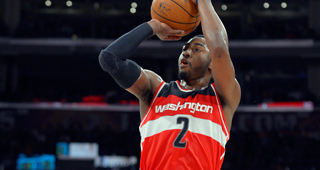The Washington Wizards didn’t have enough. That much was obvious at the outset, but to drive the point home, Jason Smith got fourth quarter minutes in a Game 7. (Jae Crowder, in a richly metaphorical drive to the basket, scored on Smith while sending him toppling toward the baseline cameras.) No one would have predicted execution at the hands of a smoked out Coen Brothers goon, but the Wiz have fatal flaws—most crucially, a bench that begins and ends with Bojan Bogdanović. There was always going to be an inopportune night when John Wall’s crunchtime isolation game sputtered, Bogdanović played anonymously, and the defense didn’t hold up. Maybe it’s preferable to go out like that—narrowly, due to your own deficiencies and Kelly Bleeping Olynyk briefly knocking the Homeless Man’s off that Dirk comparison—than to suffer a week-plus of double-digit halftime deficits, serving as an audience to LeBron James’s increasingly expressive physical comedy. You can head into the offseason shaking your head rather than having it shoved into the mud.
There aren’t many recriminations to make after a moderately well-played series. Scott Brooks is an okay coach who seems more dunce-like than he actually is because he couldn’t work out the simple math and/or complex ego herding of staggering Russell Westbrook and Kevin Durant’s minutes, but he’s cracked it in Washington. (Perhaps out of necessity. The Wizards’ best backup point guard is Bradley Beal.) Kelly Oubre got into the sort of series-derailing tiff you can expect from a 21-year-old. Ian Mahinmi was useless, but then he is Ian Mahinmi.
While every non-championship season ends unpleasantly, with the team feeling as if they could have played better, on the whole, the Wiz were a success this year. They were miserable to start the season, unleashed some of the best basketball in the league over the winter, then settled into acceptable Pretty Goodness the rest of the way. In the process, Otto Porter completed his transformation from finesseless string bean into a genuinely useful starter. Wall and Beal more or less figured out how to amicably share a backcourt, and even more importantly, Beal clocked the first healthy season of his career. In a season where the Wiz could have collapsed toward seven-seedish mediocrity or solidified themselves as an upper-middle class Eastern Conference team, they achieved the more desireable result.
Bourgeoisie status is fine during the regular season, but it gets depressing around this time of year, when perfectly fine squads split their heads open against god’s ceiling. The Wizards are dynamic and fun. They’re also stuck in their station, one star or a killer bench away from truly putting a scare into the Cavaliers, but with no means of acquiring either. They don’t have a first-round draft pick after shipping their selection to the Nets for Bogdanović, so landing a cost-controlled rotation player almost definitely isn’t happening. Re-signing both the Croat and Otto Porter is going to take them over the salary cap and possibly past the luxury tax threshold, which means their free agency options are severely limited.
They lack moveable contracts. Marcin Gortat has two more years and $26 million left on his deal and Mahinmi is signed, crushingly, through 2020 at about $16 million per year. Jason Smith is locked in for 2017-18 at $5.2 million and has a player option for 2018-19 at $5.4 million. The extent to which the Wiz improve next season is probably going to depend mostly on Kelly Oubre’s development. A breakout isn’t impossible, but right now he’s a 42 percent shooter without three-point range who played 20 minutes per night and sat out nearly all of the Wizards’ final two games of the year. Prime Jared Dudley, let alone something more fearsome than that, is a tough ask.
In pessimistic terms, the Wizards are screwed—so long as LeBron is posting playoff triple-doubles, perhaps moreso if the Celtics vault into the league’s uppermost echelon with a trade or a great draft selection—but they also present the question of what a franchise should do when there’s nothing to be done. We don’t think of maintaining a level of competency as an active thing, but it’s taxing to stay as good as you can be at what you do, and it’s doubly difficult when you know it won’t be good enough to get you where you want to be. Tom Thibodeau’s post-Derrick Rose injury Bulls embodied this unromantic struggle, sweatily blurring the line between belief and delusion. The present-day Grizz are seven years into a run of spectacularly bruising playoff demises, annually refining their own brand of rough-hewn heroism. This isn’t ideal, and it isn’t completely satisfying, but it is better than getting bored and dispirited and falling off. See this year’s malaise-burdened Blazers, or the Clippers, who have been ricocheting against the insides of their own skulls for the past two seasons.
There’s scant motivation in pushing against your own limitations for the sake of ultimate failure, but it’s the Wizards only path toward spiritual sustenance. They’re a capable team with some significant, likely unfixable problems. To continually draw pride from that—to lose with some dignity and appreciation for what’s been accomplished—is wearying work, but the alternative is an abject, checked out coast toward oblivion (or a first-round sweep). Whether the Wizards find it worth the strain to choose the superior, imperfect, more laborious option is something we’re soon going to find out.



